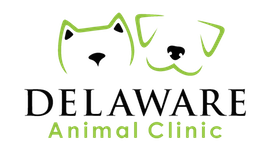
“Ewww, Fido, your breath stinks. Don’t lick me!?” Do you find yourself saying similar words to your pet? There is no doubt that bad breath in our kitty and doggie friends is unpleasant, but could it represent a more serious problem? In a word ? YES!
Inside your pet’s mouth live thousands of bacteria. These bacteria can adhere to the teeth and make a clear, sticky film called plaque. As plaque hardens and becomes mineralized, it turns into tartar. This tartar and all its bacteria then work their way under the gum line to cause gingivitis, recession of gums, and eventually bone destruction and tooth loss. The bacteria can also enter the blood stream and travel throughout the body, causing damage to the heart, lungs, kidneys and liver.
Oral health problems are widespread in our pets. Approximately 70% of cats and 80% of dogs have evidence of dental disease by age 2 years, making it one of the most common diseases affecting our pets. Fortunately, there are steps you can take to help improve your pet?s dental health.
The most effective preventative measure is daily brushing of your pet’s teeth. Be sure to use specially formulated pet toothpaste and go slowly when first starting. If your pet is aggressive or does not tolerate having the mouth handled, do not force the tooth brushing. Also, never use human toothpaste or baking soda on your pets, as these can lead to GI disturbances. There are also specially formulated dental diets, dental treats and chews, as well as oral health rinses which will aid in preventing plaque and tartar build-up. Be sure to ask your veterinarian about what is best for your pet.
Finally, just like we need to go to the dentist for regular exams and cleanings, so do your pets. When your pet is being examined by their veterinarian, be sure that the doctor does a full exam which includes the mouth and teeth. Recommendations can then be made based on the degree of dental disease. You may even be told that your pet needs to have the teeth cleaned. Take this advice seriously. Remember, dental disease is more than just stinky breath. It is infection in the mouth which, not only can affect other body organs, but can cause great discomfort to your furry family members. So “flip the lip” and take the first steps toward good dental health for your pet.
